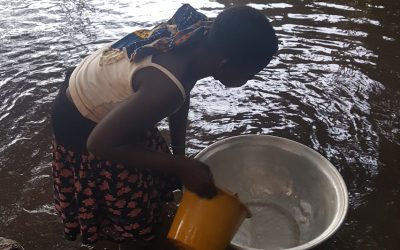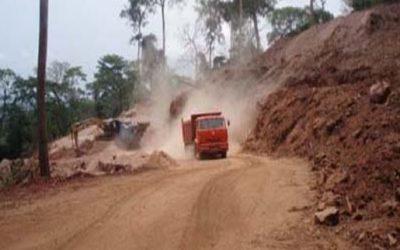Côte d'Ivoire
The Case of the mining community of Similimi
Similimi is a village in the Sub-District of Bondoukou, about 430 km from Abidjan in the Republic of Côte d’Ivoire, perched on a hill and surrounded by lushly vegetated mountains.
Two ethnic communities co-exist in Similimi – the Abron and the Koulango – but the village has long been neglected by the Ivoirian government. There is no health clinic, and the residents must travel an unpaved road to access health facilities in Sapli, about 4 km away. Before ACA and its Ivoirian partner, Groupe de Recherche et de Plaidoyer sur les Industries Extractives (GRPIE), began working in the community, the village school, which was built by the residents themselves, was a three-room, rickety wooden structure with an earthen floor and holes in the ceiling that leaked during the rainy season. The two teachers were paid by the villagers and not by the State. Similimi had no water taps, public water sources, or electricity. The residents took water from the river at the base of the hill for their daily needs. Women and children had to descend the slippery slope to draw water and then climb back up again – a difficult and dangerous activity for those who are not accustomed to it.
The tranquil life of the people of Similimi has been turned upside down by a mining company,Bondoukou Manganèse. The extraction of manganese at Similimi should have brought development and positive impacts to the community. Instead, the company has dug pits less than 200 meters from the entrance to the village and carved holes around the residential areas and agricultural fields of the community. The primary extraction site is less than 100 meters from the village, endangering the inhabitants, whose lives have been invaded by the mining activities. The extraction of manganese has polluted their air and water and robbed them of their land and means of income with negatives consequences without prior and just compensation. The company has also destroyed the sacred hill where the residents previously conducted traditional practices. Considering all this, the community needs to be relocated immediately.
Although the residents have complained to the authorities many times, no action has been taken to protect them from the negative impacts of manganese extraction activities. To defend their interests and secure a remedy for the human rights violations they have suffered, ACA and
GRPIE have teamed up with local lawyers to support the people of Similimi with the following:
Awareness Raising
Organizing several meetings with the people of Similimi to help them understand their rights and the strategic actions they can take to address the risks of mining and defend their interests. Organizing a learning exchange to share experiences with other communities that have been affected by mining and been through the process of relocation.
Advocacy
Advocating and lobbying Ivoirian authorities about the need to relocate the community.
Creating pressure at the international level on the dangers and suffering faced by the people of Similimi.
Organizing workshops to train and exchange views with administrative authorities about the impacts of the mining operations on the lives of the Similimi residents, national and international standards on relocation, and the associated risks.
Legal strategy
Conducting missions to investigate, document, and collect testimony and evidence necessary for legal action at the national level against Bondoukou Manganèse and at the ECOWAS Court of Justice against the government of Côte d’Ivoire. Collaboration with the law firm SCPA les OSCARS in Côte d’Ivoire to provide pro bono legal assistance to the community and represent them in national and regional forums.
Updates
On Thursday, November 30, 2023, the ECOWAS Court of Justice, at its sitting in Abuja, declared the Republic of Côte d’Ivoire guilty and ordered the government to pay 20 million CFA Francs each to eleven individual plaintiffs and to repair the environmental damage caused by the mining project.
Residents of Similimi could not hide their joy upon hearing this as they celebrated this decision of the ECOWAS Court of Justice, which found the Ivorian government culpable of human rights violations in connection with destructive manganese mining on their traditional lands.
On Monday December 11, 2023, the ECOWAS Court of Justice released its judgment on the ruling, which justified its earlier ruling against the Ivorian government in a case brought before it by 14 representative inhabitants of Similimi, along with a communal self-help organization.
“It is precisely this failure to act, to prevent environmental damage and to hold offenders accountable, who feel free to carry out their damaging activities with a clear expectation of impunity, that characterizes the Respondent State’s violation of articles 1, 16 and 24 of the African Charter and article 12 of the ICESCR”, the court said in its ruling.
The court further accused the Ivorian government of failing to take adequate steps to protect the environment, saying: “It is important to note that, despite all the laws it has passed and all the agencies it has created, the Respondent has not been able to point, in its defense, to a single action that has been taken in recent years to hold to serious and diligent account the perpetrator of the many acts of environmental degradation that have taken place in the Similimi region.”
The Court’s November 30 ruling indeed affirms the plaintiffs’ long-held view that the State is in fact responsible for violations of Similimi community’s rights to a healthy environment, to health, to an adequate standard of living, to private and family life, and freedom of worship and religion. The Court dismissed the Applicants’ claim that their right to property was violated, for lack of sufficient evidence of ownership.
September 2022 - Plaintiffs await appointment of a new judge
The Ivoirian government continues to organize meetings with the residents of Similimi, with the aim of eventually relocating them.
January 2021 - Similimi residents sue the Republic of Côte d’Ivoire in the ECOWAS Court of Justice
The plaintiffs allege the government is responsible for facilitating the pollution of their natural environment, the appropriation of their traditional lands, and the destruction of their sacred sites. The Court initially set the date to release its ruling in February 2022, but later postponed, and eventually the judge’s 5-year mandate expired before the new release date could be set.
August 2020 - Independent environmental impact study of BMSA’s operations
GRPIE commissioned the study which revealed dangerous levels of particulate matter and noise pollution.
October 2019 to May 2020 - Government orders the company to disclose the documents related to environmental impact
The lawyers for Similimi requested and were granted “ordonnances de compulsoire” – orders from a court that require the company and the government to disclose the documents related to the company’s environmental impact study. The documents provided as a result of the order reveal important procedural gaps that provide opportunities for the community to challenge the company’s renewed operating permit.
News
SIMILIMI
What happened? The inhabitants of Similimi, a village in the sub-prefecture of Bondoukou, about 430 km from Abidjan in the Republic of Côte d'Ivoire, mainly grew cashew nuts, planted other fruit trees, legumes and vegetables on plots of land before manganese mining...
Similimi residents triumph over Ivorian government in ECOWAS Court
Residents of Similimi, a village in northeastern Côte d'Ivoire, are celebrating a decision of the ECOWAS Court of Justice finding the Ivorian government culpable of human rights violations in connection with destructive manganese mining on their traditional lands. At...
Victims of Land Grabbing and Environmental Damage File Suit against Côte d’Ivoire in the ECOWAS Court of Justice
Similimi in Abuja, 29 January 2021 – Frustrated by years of land loss, environmental destruction and stalled promises of relocation, the people of Similimi Community in northeastern Côte d’Ivoire have filed suit against their own government at the ECOWAS Court...

